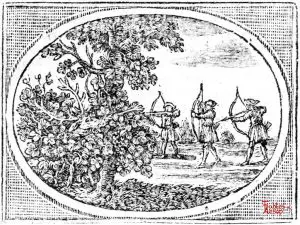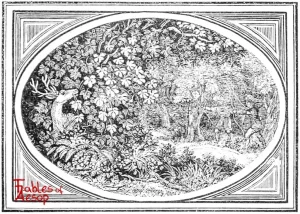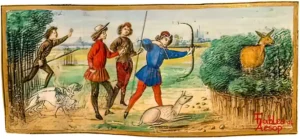Do not mistreat those who help you. A Hart (stag) hides from hunters in vines. The Hart starts to nibble on the vines and gives himself away. Too bad.
Do not mistreat those who help you.
[Note: This fable is basically the same as The Goat and The Vine except for the animal involved.]

Townsend version
A hart, hard pressed in the chase, hid himself beneath the large leaves of a Vine. The huntsmen, in their haste, overshot the place of his concealment. Supposing all danger to have passed, the Hart began to nibble the tendrils of the Vine. One of the huntsmen, attracted by the rustling of the leaves, looked back, and seeing the Hart, shot an arrow from his bow and struck it. The Hart, at the point of death, groaned: “I am rightly served, for I should not have maltreated the Vine that saved me.”

JBR Collection
A Hart being hard pursued by the hunters, hid himself under the broad leaves of a shady, spreading Vine. When the hunters had gone by, and given him over for lost, he thought himself quite secure, and began to crop and eat the leaves of the Vine. The rustling of the branches drew the eyes of the hunters that way, and they shot their arrows there at a venture, and killed the Hart. In dying, he admitted that he deserved his fate, for his ingratitude in destroying the friend who had so kindly sheltered him in
time of danger.

Samuel Croxall
A HART being pursued hard by the hunters, hid himself under the broad leaves of a shady spreading Vine. When the hunters were gone by, and had given him over for lost, he, thinking himself very secure, began to crop and eat the leaves or the Vine. By this means the branches, being put into a rustling motion, drew the eyes of the hunters that way; who, seeing the Vine stir, and fancying some wild beast had taken covert there, shot their arrows at a venture, and killed the Hart, who, before he expired, uttered his dying words to this purpose; Ah! I suffer justly for my ingratitude, who could not forbear doing an injury to the Vine that so kindly concealed me in time of danger.
THE APPLICATION
Ingratitude has always been esteemed the biggest of crimes, and what, as it were, comprehends all other vices within it. Nor can we say, that this estimation is rashly or unadvisedly made; for he that is capable of injuring his benefactor, what will he scruple towards another? If his conscience cannot be felt with the weight of an obligation added to it, much less will it have any influence where there is none. So that, upon, the whole, we may conclude, that the man who has been once guilty of ingratitude, will not stick at any other crime of an inferior nature. Since there are no human laws to punish this infamous prevailing mischief, it would be a great piece of human prudence to mark and observe this kind of criminals, in order to avoid all manner of communication with them. And if this were strictly put into execution, it could be looked upon as no oilier than a just and proper punishment.

Thomas Bewick (The Hart and The Vine)
A Hart being closely pursued by the Hunters, concealed himself under the broad leaves of a shady Vine. When the Hunters were gone by, and had given him over for lost, he thinking himself very secure, began to crop and eat the leaves of his shelter. By this, the branches being put into a rustling motion drew the attention of some of the Hunters that way, who seeing the Vine stir, and fancying some wild beast had taken covert there, shot their arrows at a venture, and killed the Deer. Before he expired, he uttered his dying words to this purpose: “Ah!” says he, “I suffer justly for my ingratitude; because I could not forbear doing an injury to the Vine, which so kindly concealed me in time of danger.”
APPLICATION.
There is no maxim which deserves more frequent repetition, and if the heart be capable of amendment by precept and admonition, no virtue should be more strongly enforced and recommended than gratitude. Where sentiments of this kind are wanting, our natures soon become debased, and our minds depraved. Ingratitude has ever been justly branded as the blackest of crimes, and, as it were, comprehending all other vices within it. Nor can we say that this opinion is too severe: for if a man be capable of injuring his benefactor, what will he scruple doing towards another? We may fairly conclude that he who is guilty of ingratitude, will not hesitate at any other crime of an inferior nature. Since there are no human laws to punish this infamous prevailing vice, it would only be doing an act of justice, and supplying the want, to point out criminals of this description to the reprobation of mankind, that men of worth might avoid all intercourse and communication with them. The ingrate should also bear in mind, that he strips himself of the protection which might have been afforded by his friends, and exposes himself to the shafts of his enemies, who will not fail to take advantage of the defenceless state to which his folly and depravity have reduced him.
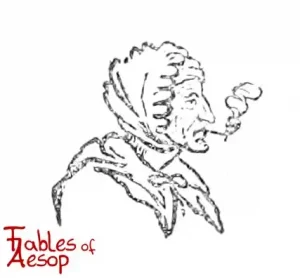

Crane Poetry Visual
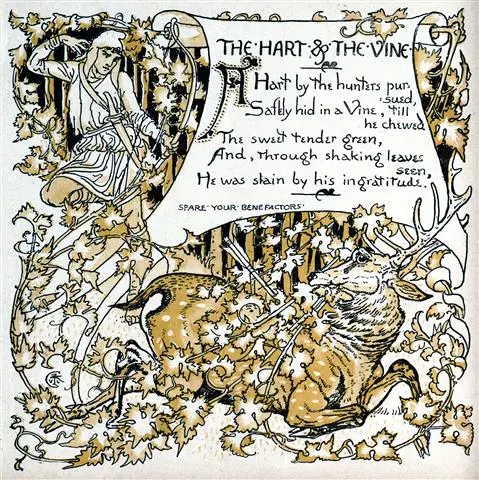
A Hart by the hunters pursued,
Sadly hid in a Vine, till he chewed
The sweet tender green,
And, through shaking leaves seen,
He was slain by his ingratitude.
Spare your benefactors.

Gherardo Image from 1480

Cervus et Vitis
Fugiens venatores, cerva sub vite latebat. Mox frondibus vitis vesci incepit. Ramos vero agitatos venatores videntes, sagittis cervam confecere. Moriens ait, “Haec merito patior, quia viti bene facienti nocebam.”
Perry #077
